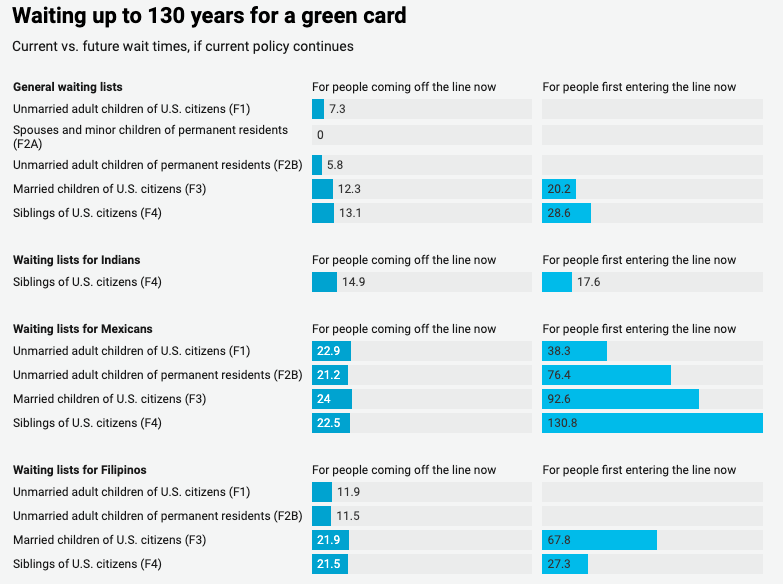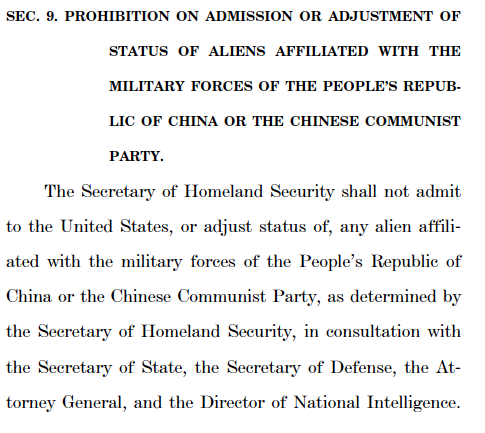Last night, the Fairness for High-Skilled Immigrants Act (S.386/H.R.1044) passed the Senate by unanimous consent. A different version passed the House last year, so the bill is closer than ever to becoming law—yet still by no means a done deal.
Here's why this matters...
1/
Here's why this matters...
1/
The fundamental problem is stark: 30 years ago, Congress accidentally set the stage for massive green card backlogs that disproportionately afflict skilled workers from India (& to a lesser extent China).
( @David_J_Bier has the latest numbers:)
2/ https://www.cato.org/blog/employment-based-green-card-backlog-hits-12-million-2020
( @David_J_Bier has the latest numbers:)
2/ https://www.cato.org/blog/employment-based-green-card-backlog-hits-12-million-2020
There are lots of temporary work visas—most prominently/controversially the H-1B—but Congress capped employment-based *permanent* status (green cards) at 140,000/year, including spouses & children of the primary workers.
But wait, it gets worse...
3/ https://www.migrationpolicy.org/content/explainer-how-us-legal-immigration-system-works
But wait, it gets worse...
3/ https://www.migrationpolicy.org/content/explainer-how-us-legal-immigration-system-works
No single country is allowed to account for >7% of the annual green card caps, including both employment-based & family-based.
That means there's no single "line" to get a green card—there are many lines, with wildly different wait times, depending on country of origin.
4/
That means there's no single "line" to get a green card—there are many lines, with wildly different wait times, depending on country of origin.
4/
Temporary workers from India found themselves squeezed by this country-based bottleneck & in an ever-lengthening green card queue.
Congress passed a half-measure in 2000 allowing indefinite H-1B extensions for those in the queue.
5/ https://www.shusterman.com/ac21faqins/
Congress passed a half-measure in 2000 allowing indefinite H-1B extensions for those in the queue.
5/ https://www.shusterman.com/ac21faqins/
There are two major steps toward getting an employment-based green card:
1) Approval of employer sponsorship
2) Approval of green card application
For most people, these two steps happen not too far apart.
For Indian H-1B workers, the gap is decades & getting worse.
6/
1) Approval of employer sponsorship
2) Approval of green card application
For most people, these two steps happen not too far apart.
For Indian H-1B workers, the gap is decades & getting worse.
6/
So now we have over a million people living & working in the US, with a *gov't-approved green card sponsorship,* who would have gotten permanent residency & become US citizens by now, but for their country of origin.
Not only is this unfair; it's causing real harm.
7/
Not only is this unfair; it's causing real harm.
7/
Imagine being stuck on an H-1B visa while awaiting permanent residency.
Your immigration status—& your place in the green card line—largely depend on staying in the good graces of your current employer.
Forget about rocking the boat by demanding a raise or blowing a whistle.
8/
Your immigration status—& your place in the green card line—largely depend on staying in the good graces of your current employer.
Forget about rocking the boat by demanding a raise or blowing a whistle.
8/
If your kid turns 21 before your family gets to the front of the green card line, they lose their place *and their immigration status.*
(This problem is known as "aging out.")
9/ https://www.forbes.com/sites/stuartanderson/2020/01/07/new-lawsuit-tries-to-save-immigrant-children-from-aging-out/?sh=67a8e2acff36
(This problem is known as "aging out.")
9/ https://www.forbes.com/sites/stuartanderson/2020/01/07/new-lawsuit-tries-to-save-immigrant-children-from-aging-out/?sh=67a8e2acff36
One obvious solution: Eliminate the country caps on employment-based green cards!
In 2011, just such a bill passed the House, 389-15.
In 2013, comprehensive immigration reform would've solved it, but House Republicans spiked the Senate bill.
10/ https://www.nbcnews.com/politics/first-read/why-immigration-reform-died-congress-n145276
In 2011, just such a bill passed the House, 389-15.
In 2013, comprehensive immigration reform would've solved it, but House Republicans spiked the Senate bill.
10/ https://www.nbcnews.com/politics/first-read/why-immigration-reform-died-congress-n145276
The House passed a country caps bill again last year, 365-65.
But getting unanimous consent in the Senate means horse-trading with up to 100 Senators, so the version that passed last night is loaded up with new provisions.
Let's have a look...
11/ https://www.congress.gov/amendment/116th-congress/senate-amendment/2690/text
But getting unanimous consent in the Senate means horse-trading with up to 100 Senators, so the version that passed last night is loaded up with new provisions.
Let's have a look...
11/ https://www.congress.gov/amendment/116th-congress/senate-amendment/2690/text
Sec. 2:
*No more employment-based country cap, but phased in over 10 years
*Family-based country cap increased to 15%
*For 7 years, nurses (& physical therapists) get no fewer than 4,400 green cards
12/
*No more employment-based country cap, but phased in over 10 years
*Family-based country cap increased to 15%
*For 7 years, nurses (& physical therapists) get no fewer than 4,400 green cards
12/
Sec. 3-6: A bunch of protections against misuse of the H-1B program, many long sought by Sen. Durbin (D-IL) & Sen. Grassley (R-IA).
13/
13/
Sec. 7: Most people with an approved employer sponsorship can file early for a green card—they may still have to wait a long time to actually become permanent residents, but will have much-improved job portability in the meantime. This is a big deal.
14/
14/
Sec. 8: Limits the number of employment-based green cards that can go to H-1B workers & their families to 70% of the total, dropping to 50% after 9 years.
This is new. And seemingly arbitrary, with who knows what adverse consequences down the road.
15/
This is new. And seemingly arbitrary, with who knows what adverse consequences down the road.
15/
Sec. 9: A new provision that bans anyone "affiliated with" the Chinese military or Chinese Communist Party. This is bound to be highly controversial.
16/
16/
Politically, this is how we got here:
The best solution would be to just provide more green cards every year, but Republicans are sworn to some unwritten @GroverNorquist-style vow to never allow more green cards on net.
17/
The best solution would be to just provide more green cards every year, but Republicans are sworn to some unwritten @GroverNorquist-style vow to never allow more green cards on net.
17/
This creates a perilous zero-sum dynamic with perceived winners & losers, and no unanimity among advocacy groups about the best path forward.
18/ https://www.niacouncil.org/news/24-groups-to-senate-halt-damaging-green-card-bill/?locale=en
18/ https://www.niacouncil.org/news/24-groups-to-senate-halt-damaging-green-card-bill/?locale=en
In the world of immigration reform, even seemingly narrow legislative fixes are relatively rare & difficult to enact.
If a reasonable compromise isn't signed by Trump, hopefully there's a chance to enact an enduring solution to this vexing problem in the next Congress.
19/19
If a reasonable compromise isn't signed by Trump, hopefully there's a chance to enact an enduring solution to this vexing problem in the next Congress.
19/19

 Read on Twitter
Read on Twitter



